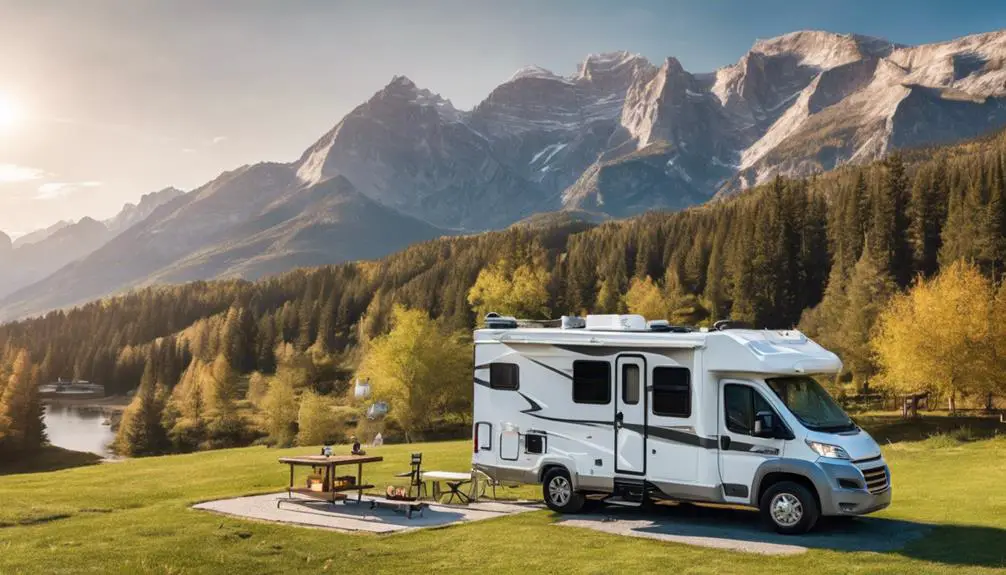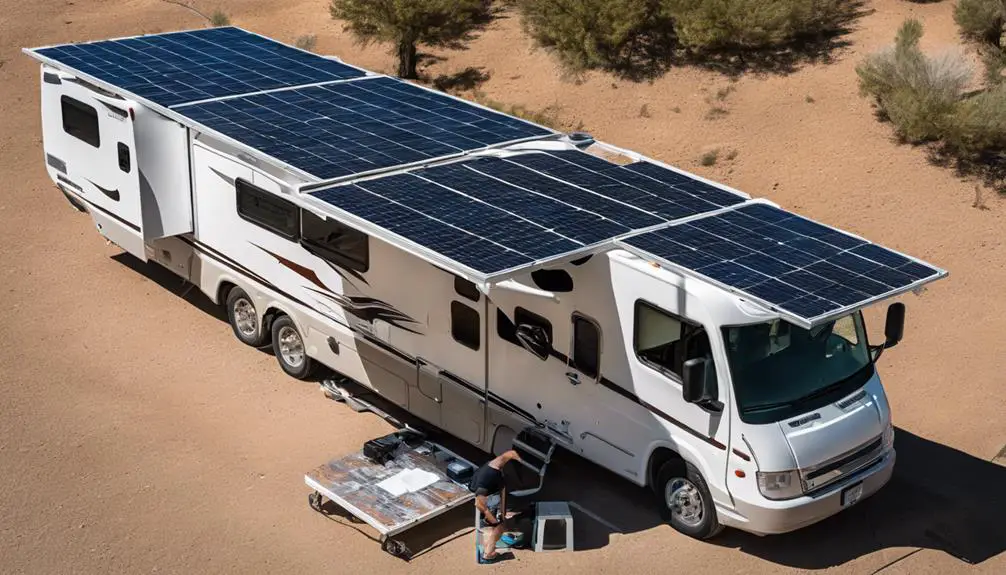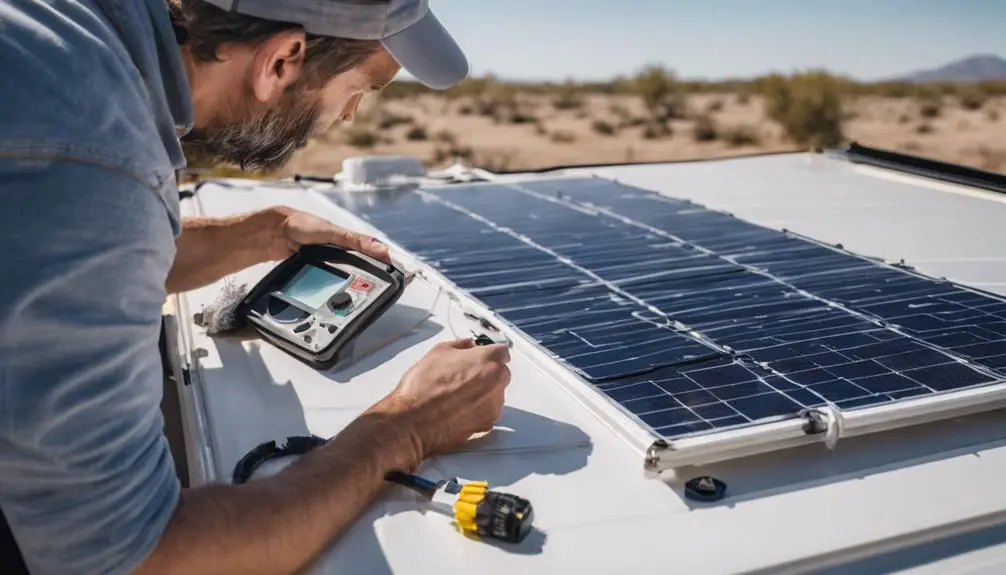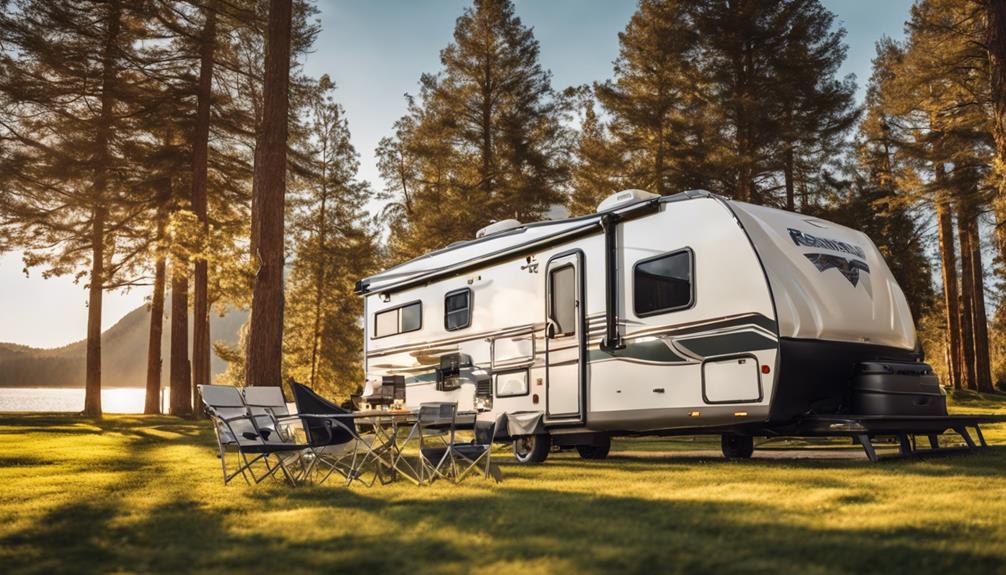Maximize your RV's energy efficiency with RV solar panel kits, providing off-grid power for flexibility and cost-saving benefits. Choose between portable, roof-mounted, or ground-mounted kits based on your setup and power needs. Consider factors such as quality, energy output, and compatibility before purchasing. Guarantee a smooth installation by mapping out sunlight exposure, securely mounting panels, and connecting them properly. To prolong longevity, maintain your panels regularly with cleaning and inspection routines. Take your RV adventures to the next level with sustainable power solutions that align with your travel aspirations.
Benefits of RV Solar Panels

One major advantage of using RV solar panels is their capability to provide off-grid power, allowing you to enjoy greater flexibility and independence during your travels.
When considering the cost savings associated with RV solar panels, while the initial investment can be substantial, the long-term savings on fuel and campground fees make them a financially wise choice. By harnessing the power of the sun, you can significantly reduce or even eliminate your reliance on traditional power sources, cutting down on expenses in the long term.
Additionally, the environmental impact of RV solar panels can't be overstated. By utilizing clean, renewable energy, you're markedly reducing your carbon footprint and contributing to a greener planet. This eco-friendly approach not only benefits the environment but also sets a positive example for others in the RV community.
With RV solar panels, you can enjoy cost savings while making a positive impact on the world around you.
Types of Solar Panel Kits
When exploring RV solar panel kits, it's important to understand the various types available to meet your specific power needs and installation requirements. Portable options offer flexibility as they can be adjusted to capture more sunlight. They're ideal for those who frequently change locations. Size considerations are vital when opting for portable kits, as you want a balance between power generation and ease of transportation.
Roof-mounted panels are a popular choice for RV owners looking for a more permanent solution. They're securely installed on the roof of your vehicle, utilizing the available space efficiently.
On the other hand, ground-mounted panels provide the flexibility to adjust the angle for better sunlight exposure. This option is suitable for RVers who prioritize maximizing energy efficiency over convenience.
Deciding between roof-mounted and ground-mounted panels depends on your RV setup, travel habits, and power requirements. Understanding the differences between these types of solar panel kits will help you make an informed decision based on your specific needs.
Factors to Consider Before Buying

Before purchasing an RV solar panel kit, it's important to carefully evaluate specific factors to make sure you select the most suitable option for your needs. When considering budget considerations, keep in mind that higher-priced kits often offer better quality and efficiency, leading to long-term savings.
Energy efficiency is a vital aspect to assess as it determines how well the panels can convert sunlight into usable electricity. Look for kits with high energy efficiency ratings to maximize power generation.
Another essential factor is the installation location. Confirm that the kit you choose is compatible with the space available on your RV and consider factors like tilt angles and shading to optimize sunlight exposure.
Additionally, evaluating the power output of the kit is important. The power output determines how much electricity the panels can generate, so select a kit that aligns with your energy needs.
Installation Process Explained
To properly install an RV solar panel kit, begin by carefully mapping out the placement of the panels on the roof of your vehicle. Consider factors such as the angle for best sunlight exposure. When positioning the panels, make sure they're securely mounted to prevent any movement during travel. There are various mounting options available, including fixed mounts, tilt mounts, and portable options. Choose the one that best suits your needs and provides stability for the panels.
Next, focus on the wiring essentials. Connect the solar panels to a charge controller using appropriate gauge wires to minimize energy loss. The charge controller regulates the voltage and current coming from the panels to prevent overcharging the batteries. From the charge controller, wire the system to the RV's battery bank using the correct fuses and disconnect switches for safety.
Proper installation of RV solar panel kits is essential for efficient energy generation and storage. By carefully following these steps and considering mounting options and wiring essentials, you can harness the power of the sun to enhance your RV experience.
Maintenance Tips for Longevity

Maintaining the longevity of your RV solar panel kit requires regular upkeep and attention to key components. To maintain peak performance, start with cleaning tips.
Periodically clean the surface of the solar panels with a gentle soap and water solution, avoiding abrasive materials that could scratch the panels. Additionally, check the connections for any signs of corrosion and tighten them if necessary to prevent voltage drops.
When troubleshooting issues, begin by inspecting the wiring for any loose connections or damage. Use a multimeter to test the voltage output of the solar panels and optimize they're producing the expected power levels. If there are performance issues, check the charge controller for any error codes and refer to the manufacturer's manual for guidance.
Regularly monitor the battery levels and optimize they're being properly charged by the solar panels. If you encounter persistent problems, consider seeking assistance from a professional to diagnose and address any underlying issues promptly.
Frequently Asked Questions
Can RV Solar Panels Be Used in Extreme Weather Conditions?
In extreme weather conditions, such as snow coverage or desert heat, RV solar panels can face challenges. Snow can hinder sunlight absorption, while excessive heat may reduce panel efficiency. Proper maintenance and adaptations are essential for peak performance.
How Do Solar Panels Affect the Resale Value of an Rv?
When considering the impact of solar panels on an RV's resale value, energy efficiency and aesthetic appeal play pivotal roles. Solar panels can increase value by boosting energy efficiency and modernizing the appearance of your RV.
Are There Any Tax Incentives for Installing Solar Panels on an Rv?
You can benefit from tax credits when installing solar panels on an RV. The installation process is straightforward. With cost savings and a positive environmental impact, solar power is a smart choice for your RV.
Can Solar Panels Be Used to Run Air Conditioning in an Rv?
To run air conditioning in an RV using solar panels, you need high energy efficiency models, proper battery storage, and enough panels to meet the demand. This setup supports off-grid living, ensuring sustainability and comfort.
What Is the Lifespan of RV Solar Panels?
Solar panel effectiveness is influenced by factors like angle and shading. Regular maintenance, such as cleaning and monitoring for damage, can prolong their lifespan. Following maintenance requirements is important to guarantee peak performance and longevity.
Conclusion
Overall, investing in RV solar panel kits is a wise choice for any enthusiastic traveler aiming to save on energy expenses and decrease their environmental impact.
With different types of kits accessible on the market, it's crucial to take into account factors such as size, efficiency, and budget before making a purchase.
Once installed, proper upkeep will guarantee the longevity and efficiency of your solar panels, offering you a dependable and eco-friendly source of power while traveling.
